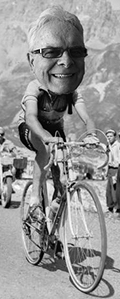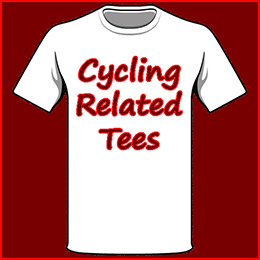Change
 Mon, July 26, 2010
Mon, July 26, 2010 When I wrote about Edwin Gardner’s accident last Friday, I did so because he was an important figure in my local cycling community. I met him last February when I participated in a bicycle lecture series in downtown Charleston.
My post was not meant to put a negative spin on the dangers of riding a bike. When I wrote the piece, the thought that Edwin might die from his injuries never entered my head.
I knew his injuries where extremely serious, but he had survived two days, I expected him to pull through. It came as a great shock when I learned later on Friday that he had passed on.
My article was somewhat of a rant commenting on a police report that placed the blame on the unfortunate cyclist, when all the facts had not been thoroughly investigated. I also registered my disgust on the negative comments from the local motoring public.
One commenter on my article said he was considering moving to Charleston, but after “Horror stories like this,” he was having second thoughts. I have lived both on the east and west coasts of the US, and I can say that Charleston is the best place I have ever lived.
The negative comments by the locals are no different than those from any city in the US whenever there is a cycling related story published. The State of South Carolina and my local government is trying to become cycling friendly. Many positive changes are taking place.
Pro-cycling change is happening all over the US, and I believe it is partly because of this change that the non cycling public is kicking against it; people don’t like change.
I was in a local bar on Saturday evening listening to music being played by some of my friends. It was a quiet evening with not many patrons; a young black man was sitting at the bar. Later I noticed a young white male came in and took the seat next to him.
The two did not speak at first; it seemed they didn’t know each other. Then the barman gave them both a free shot; the two clinked their glasses together before drinking it down.
I thought, ‘How wonderful is that.’ Here in the South where not too long ago in the 1950s and 1960s, during my lifetime, there was so much hatred and mistrust. A new generation of young people who accept others for who they are, and can ignor their racial differences.
My point is this, you can’t legislate that people love each other. Legislation comes first, people fight it, even violently, but given time they see they cannot go on fighting and give in to the idea.
Change finally comes when there are more accepting the change than fighting against, and it becomes socially unacceptable to even speak out against it. Those hate comments that follow cycling related articles will in time become unacceptable.
We can grieve Edwin Gardner’s passing, and others like him. But let’s not dwell on the negativity of the event, or be afraid to ride our bikes on the road, instead see the whole picture in perspective.
700 cyclists are killed in the US each year; that is less than two a day. Less than two a day out of a population of over 300 million. I’m sure many more die each day in home related accidents. I have not looked up the figures for the UK or other countries, but I’m sure the ratios per population are similar.
Two cyclists will die on US roads on any given day, and on that same day close to a 100 motorists will be killed. There is more chance I will die driving my car than riding my bike.
I like my chances riding my bike better, especially when I consider that my chance of survival will increase if I ride defensively. Many who die are those riding the wrong way, on the sidewalk, at night without lights, etc., etc.
I am sure Edwin Gardner would not have wanted one person to give up riding a bike as a result of his death. I for one, intend to keep riding mine. I will not be bullied, intimidated, or persuaded to do otherwise. And I will continue to encourage others to do the same
 Comment
Comment 






















Reader Comments (13)
As an aggressive urban cyclist, I am much aware of the fact that there are dangers involved, and I try to pay attention to what I'm doing. I travel city streets without fear, partly because for the most part I find drivers to be attentive to what I'm doing, and often respectful. As a driver myself, I understand some of the things we have to pay attention to when coming up on cyclists. There are dangers involved in all modes of travel, but all of us continue to come and go, usually without focusing upon the inherent dangers. I understand the rage that sometimes wells up when we come across moments when cyclists are maligned or disrespected or abused. And I agree that we need to keep working for more public awareness of the rights and obligations of cyclists and motorists--and how about pedestrians. A semi on a city street came close to clipping me when he had trouble making a left turn and dragged his rear wheels over the sidewalk where I was standing?
Great post!
Be well.
Gunnar
Excellent post. I think the racial analogy is very fitting. 700 cyclists dying out of a population of 300 million is a bit misleading though. It should be out of the population of people who cycle. But that's just nitpicking.
All true -- well said.
Loss is difficult and makes my heart heavy. Riding my road bicycle lightens my heart. Live in the moment.
Fear about the dangers of certain possibilities are always overblown - take the statistical likelihood of being killed by a terrorist vs being killed on the road in your car. It's not very likely. Yet we seem to worry about terrorists much more than road safety.
Bicycle awareness from the point of view of drivers is important.
Vehicle and road rule awareness from the point of view of cyclists is equally important.
As the victim of a serious bike/motor vehicle incident, I feared I would never ride again.
Once PTSD eased off, I got back on the bike.
It's much more important, and critical for my physical and mental health, that I'm out on my bicycle (especially in this beautiful weather!) than worrying I won't survive "the next one."
As you say Dave, it's statistically more likely we'll be in a car accident.
Mind you, I have retained a healthy paranoia.
Well put, Dave! Charleston and the surrounding area are probably no better and no worse than other comparable urban areas. In the past, I've enjoyed rides on Folly Island, James Island, and the surrounding area and found the general motoring public to be courteous. I just recently returned from Isle of Palms and enjoyed a 25 mile ride around IOP, Mt. Pleasant, Patriot's Point, and Sullivan Island. We were screamed at only once while receiving the international one finger salute. When the car passed us on Rifle Range Road, it had New Jersey plates. :)
My best,
Zeke
I do have to ask... is your comment about most cyclist deaths involving the cyclist salmoning, or riding on the sidewalk, or even without lights... is that actually based on data, or is that just based off your observations of bicyclist fatalities that get press-coverage?
Well said.
^^ Admittedly a quick web search turned up some data to back up your propositions... not that I bothered to read the sources, but there were enough links to satisfy (apparently I've learned nothing from Shirley Sherrod).
Thanks much for a great blog.. We love it and will be back for more!
This is CHANGE? "Get out of my way... you don't belong on our roads.. the roads were not made for bicycles, you don't pay a cent in road taxes", etc., etc.
I'd be curious Dave on how you interpret how road cycling has changed from the 70s to now. I started riding the streets in the early 60s and was glad to see the numerous changes made by the early 70s. The environmental movement, the beginning of OPEC, long lines at gas pumps, etc. woke the public to the benefits, especially the independence, that cycling and healthier lifestyles offered.
In the 80s conditions deteriorated. I too got out of the way and enjoyed the advantages of car-free riding... more mtn bikes hung in my garage than road bikes. I got out of the way, hit the trails and loved it for 15 years.
Age meant recuperation took longer and my mtn bikes were once again put aside while road bikes became my passion once again. However our roads are now more crowded than ever, the vehicles are larger, faster, there is a boom in hand held digital toys (cell phones with games even) and the drivers are more insulated from their irresponsible driving than ever imagined. With these changes came more antagonistic ("I'm bigger, more powerful and therefore I own the roads") attitudes of motorized drivers.
It's gotten so bad that communities are now being led by elected leaders who prefer less rights, more restrictions for a minority so that motorized drivers are not inconvenienced. Change is going in the wrong direction in so many ways.